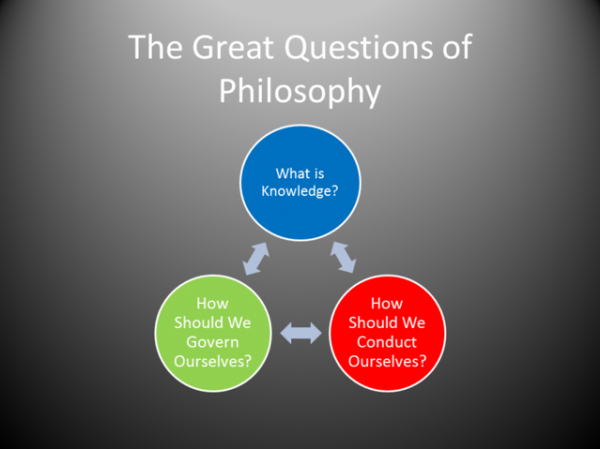By Sajeeb Sarker
What is Philosophy?
Media School July 7, 2020

Philosophy deals with the fundamental nature of knowledge. Image source: psychologytoday.com
The word Philosophy has been derived from the Greek word phílosophía. In Greek, the word phílosophía means ‘the love of wisdom’.
But this linear-looking expression is actually multi-faceted or versatile in its meaning. So, before we get into details, let's take a look into how the word 'Philosophy' is popularly defined:
Cambridge Dictionary: the use of reason in understanding such things as the nature of the real world and existence, the use and limits of knowledge, and the principles of moral judgment
Encyclopaedia Britannica: the rational, abstract, and methodical consideration of reality as a whole or of fundamental dimensions of human existence and experience
Merriam-Webster: a discipline comprising as its core logic, aesthetics, ethics, metaphysics, and epistemology; pursuit of wisdom; a search for a general understanding of values and reality by chiefly speculative rather than observational means; an analysis of the grounds of and concepts expressing fundamental beliefs
Collins Dictionary: the study or creation of theories about basic things such as the nature of existence, knowledge, and thought, or about how people should live
Oxford Dictionary of Philosophy: the study of the most general and abstract features of the world and categories with which we think: mind, matter, reason, proof, truth, etc.
Penguin English Dictionary: the study of the ultimate nature of existence, reality, knowledge and goodness, as discoverable by human reasoning
The Philosophy Pages: careful thought about the fundamental nature of the world, the grounds for human knowledge, and the evaluation of human conduct
Microsoft Encarta Encyclopedia: the rational and critical inquiry into basic principles
American Heritage Dictionary: investigation of the nature, causes, or principles of reality, knowledge, or values, based on logical reasoning rather than empirical methods
Wikipedia: the discipline concerned with questions of how one should live (ethics); what sorts of things exist and what are their essential natures (metaphysics); what counts as genuine knowledge (epistemology); and what are the correct principles of reasoning (logic)
WordNet: the rational investigation of questions about existence and knowledge and ethics
Kernerman English Multilingual Dictionary: the search for knowledge and truth, especially about the nature of man and his behavior and beliefs
Common synonyms for the word Philosophy includes: thought, reason, knowledge, thinking, reasoning, wisdom, logic, metaphysics.
Now, let's have the word 'philosophy' explained.
Department of Philosophy, Florida State University defines philosophy as: "In a broad sense, philosophy is an activity people undertake when they seek to understand fundamental truths about themselves, the world in which they live, and their relationships to the world and to each other. As an academic discipline philosophy is much the same. Those who study philosophy are perpetually engaged in asking, answering, and arguing for their answers to life's most basic questions."
After going through all these dimensions of understanding what Philosophy is, we can summarize that Philosophy is a way of seeking fundamental truths of life, or asking questions basic facts like existence, life, god, religion, truth, ethics etc. We can also say that Philosophy is the study of knowledge, or "thinking about thinking", as some would say. In other words, Philosophy is a process of knowing fundamental truths by constantly asking questions and by arguing over the answers found.
Philosophy can also be understood as the study of the fundamental nature of knowledge, reality, and existence.
The study of philosophy is not limited to finding the answers or engaging in arguments accordingly; it also insists to determining whether the arguments are good and the answers are true or not.
The ancient Greeks used the term 'philosophy' to mean the pursuit of knowledge for its own sake while it comprised all areas of speculative thoughts including the arts, sciences and religion.
From this point of view, we see that philosophy includes discussions of innumerable areas like:
• Philosophy of Law
• Philosophy of Feminism
• Philosophy of Religion
• Philosophy of Science
• Philosophy of Mind
• Philosophy of Literature
• Political Philosophy
• Philosophy of the Arts
• Philosophy of History
• Philosophy of Language
Philosophical questions are by and large foundational and abstract in nature. But it is important to understand that philosophy is done primarily through reflection and it does not tend to rely on experiment that is fundamental for science. And that is how philosophical process is different from scientific process.
References:
Cambridge Dictionary
Encyclopaedia Britannica
Merriam-Webster
Collins Dictionary
Oxford Dictionary of Philosophy
Penguin English Dictionary
The Philosophy Pages
Microsoft Encarta Encyclopedia
American Heritage Dictionary
WordNet
Kernerman English Multilingual Dictionary
https://www.philosophybasics.com
https://en.wikipedia.org
https://philosophy.fsu.edu


